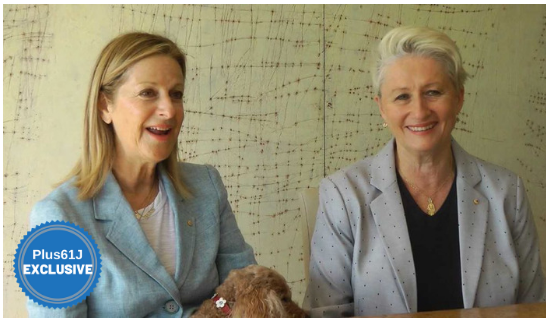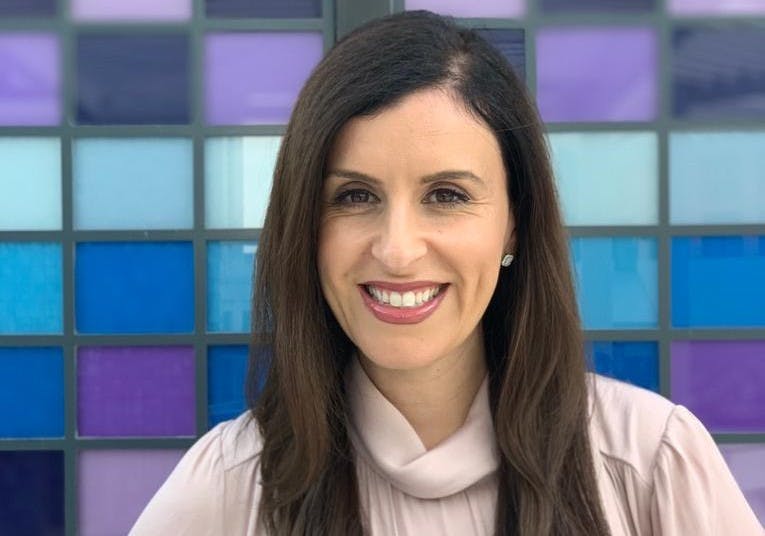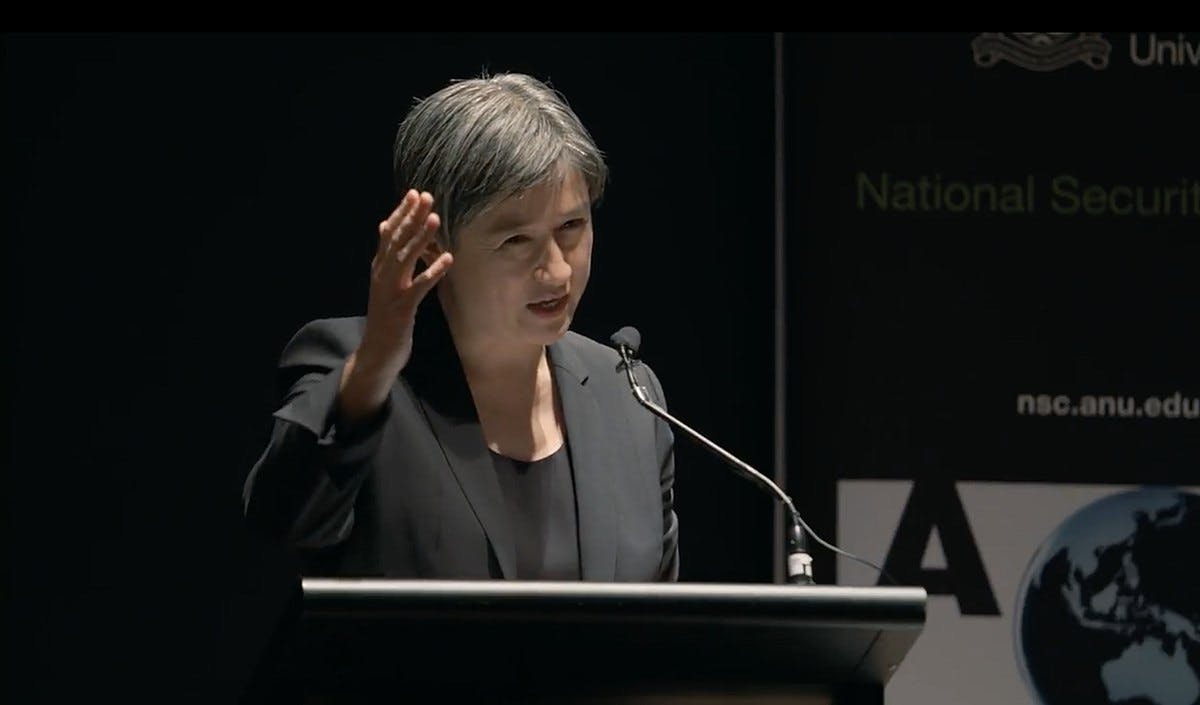Published: 7 March 2019
Last updated: 4 March 2024
Getting legally married by a rabbi is usually a simple first step for Jewish couples who want to create a marital home. Not so for this couple. In 1998, they got the rabbinic blessing, but they had to fly to America for it, and their wedding did not yet have legal status, even there.
Within months of the ceremony, the prominent doctor and her bride were the public face of gay marriage in Australia. When New York endorsed marriage equality in 2011, they flew over for a second wedding but they had to wait until 2017 for their marriage certificate to be officially recognised in Australia, when marriage equality was finally enshrined in the law.
[embed]https://youtu.be/lfgAbg5sWSY[/embed]
Phelps will talk about her advocacy of marriage equality in a keynote address (March 23) at the 25th Jewish LGBT+ World Congress to be held at Sydney’s Emmanuel Synagogue. She will also discuss some of the political activism that lead to greater acceptance in Jewish community, and the problems that still need to be tacked in Australia and abroad.
Why was marriage so personally important to Australia’s first Jewish female federal parliamentarian, and her wife, Jackie Stricker-Phelps?
Jackie has just walked the family poodles, sorted out the minor catastrophe of the deletion of a scheduling calendar and negotiated the delivery of a bed for Gabi. Nevertheless, she multitasks easily away from the practical to respond to the emotional demands of my question.
“My Jewish mother wanted the whole big white wedding,” she says. “I always felt that in some way I was disappointing her because I was not providing that. So for me the fight was personal.” Ironically, Jutta Stricker died before she could see her daughter and daughter-in-law smash the glass in a ceremony at Emmanuel Synagogue last year.
“It was happy sad,” says Stricker-Phelps. “I felt I made my mother proud, even though she wasn’t there. We renewed our vows at the same synagogue where my parents married. It was a closing of circles for me.”
[gallery columns="1" size="large" ids="26624"]
For Phelps, marriage equality is a matter of principle. “The fact that we didn’t have equality never seemed fair. I was prepared to do what it took, even if it took my whole life. It is not just about the wedding, It is about the state of being married,” she explains. Marriage communicates that acceptance of a gay spouse by other family members should be a given, not an optional extra.
To get marriage equality laws over the line, the couple talked to police, to the armed forces, prime ministers, business groups, sporting groups, and religious leaders including many rabbis. Kerryn wrote endless opinion pieces.
Phelps used the word ‘wife’ publicly to describe her spouse, for which she was roundly criticised in the first years of her activism. “Words are powerful,” she says.
“The word ’girlfriend’ was not a reflection of our relationship. Our relationships did not have a language of their own.” Without marriage, gay couples had no words to identify important family relationships: wives and husbands, in-laws and step-children.
“The word ’girlfriend’ was not a reflection of our relationship. Our relationships did not have a language of their own.”
Stricker-Phelps says she found the activism lonely at first. Phelps adds: “The amazing thing was seeing the allies come on board one after the other.”
There is a free-flowing ease in their conversation. Their style is familiarly Jewish, replete with strong opinions and humour, but there is something else as well. They respond to each other’s comments like musicians riffing together, building something new and wonderful. Ideas are interwoven in what seem initially to be interruptions but are actually additions. Sometimes they disagree, and neither takes offence. There is room for them both.
The achievement of marriage equality has allowed them time for other things. Like entering federal politics. What is it like being a parliamentarian and a parliamentary wife? They chuckle as they throw responses in the pot. It is an adjustment, but they are used to adjusting. Because of the attention that has been focused on their relationship for the past 20 years, they just pick up the baton and do the job.
Stricker-Phelps thinks it was a family decision. Phelps does not see it quite that way. She decided in herself first, it seems. “I could not have done this until now,” she says. Why not? “There are sliding doors. There have been openings in the past, but this time was right.”
Partly it is right because Gabi is now independent enough for Phelps to be away a lot. But also, it took time for Phelps herself to develop the resilience to withstand the inevitable attacks on her in her new role.
“They tried intimidation, they tried ridicule, all sorts of techniques which I saw coming from a mile off,” she explains. “Once you have experienced that in your life, you can see it coming. That is part of resilience.”
[gallery columns="1" size="large" ids="23815"]
What is it like for Phelps to hold the “power of balance” in parliament? She brushes the idea aside. “Ever so briefly…,” she quips. She is more concerned with whether she has used it wisely and for the common good.
“I think I made the most of it. I certainly took the opportunity to fulfil a promise to the electorate. I leveraged the focus on the Wentworth by-election to focus on those children who had been trapped on Nauru for five or six years of their lives, and to get them off, and then to deal with the medical crisis there.” Political strategy meets medical triage.
And what of the prime minister and opposition leader’s response to her push for the Medevac legislation? “I didn’t think they would say thank you very much,” she laughs.
What of the prime minister and opposition leader’s response to her push for the Medevac legislation? “I didn’t think they would say thank you very much."
WHILE LIFE HAS BECOME EASIER for gay people in Australia and elsewhere, there are darker shadows looming over another part of their identity. Anti-Semitism is on the rise. Phelps reports an unprecedented 59 percent increase in anti-Semitic incidents in Australia in the past year.
A few weeks ago, Bondi Beach murals were defaced with swastikas. Stricker-Phelps tells us that just this morning while she was walking the poodles, a backpacker made an anti-Semitic remark in German. She wished she could call the police, but he would be gone by the time they came.
Phelps thinks we must stay alert for all discrimination including anti-Semitism and encourage inclusion and harmony everywhere: in the workplace, in schools, in faith communities and in the family. She wants political leaders to set a better example.
“We have seen a lot of racist dog whistling going on in our own government, as well as governments around the world,” she says. “It is not OK to use any minority group or ethnic group as pawns in political gain. I will be doing my bit to call that out wherever I see it.”
[gallery columns="1" size="large" ids="26625"]
Will taking a strong stand against anti-Semitism cost her? “It is political capital I am prepared to spend,” she shoots back. “Anybody who has shown even a passing interest in my career should not be surprised that I stand up for the vulnerable.”
Phelps acknowledges that her success has inspired other independents to run in the upcoming federal election. “Women have been empowered, and some men also, to stand up and say: ‘I can be a strong, local independent. I can run a campaign, because look what happened in Wentworth.”
The new parliamentarian finds the crossbench interesting. “We are quite a diverse bunch: from the left of the political spectrum to the right and a bunch of us in the middle. We operate cooperatively. We don't always agree,” she reflects.
“We get together and talk about an issue, but there is no binding agreement on how vote on anything. If you want someone to come across to your way of thinking, you have to give them a really good reasoning as to why.”
Kind of like riffing together, I think. Freedom to disagree, to interweave ideas together, rather than tearing each other down.
Stricker-Phelps reckons that it is the way government should work. “Some countries are working towards that,” she points out. “In our constitution we are not bound necessarily to a party system.”
Phelps agrees: “People can see now how government can be done differently,” she says. “We have to see what the people want next time. They will either say we want to stay with the two party system or we want to have lots more of these independents who are capable of independent thought and who will sit on the crossbench and hold governments and oppositions to account.”
More details about the 25th Jewish LGBT+ World Congress (March 21-24, Emanuel Synagogue,. Sydney)



